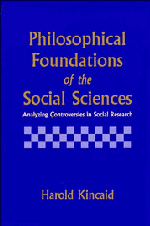Book contents
- Frontmatter
- Contents
- List of figures
- Acknowledgments
- Preface
- Chapter 1 Issues and arguments
- Chapter 2 Challenges to scientific rationality
- Chapter 3 Causes, confirmation, and explanation
- Chapter 4 Functionalism defended
- Chapter 5 The failures of individualism
- Chapter 6 A science of interpretation?
- Chapter 7 Economics: a test case
- Chapter 8 Problems and prospects
- References
- Index
Chapter 8 - Problems and prospects
Published online by Cambridge University Press: 05 June 2012
- Frontmatter
- Contents
- List of figures
- Acknowledgments
- Preface
- Chapter 1 Issues and arguments
- Chapter 2 Challenges to scientific rationality
- Chapter 3 Causes, confirmation, and explanation
- Chapter 4 Functionalism defended
- Chapter 5 The failures of individualism
- Chapter 6 A science of interpretation?
- Chapter 7 Economics: a test case
- Chapter 8 Problems and prospects
- References
- Index
Summary
In this last chapter I conclude my argument by taking up two closely related questions: Why haven't the social sciences fared better and what can be done to improve them? In past chapters I often criticized arguments alleging that no science of society is possible. Yet many of the arguments I criticized were also put forth as explanations – explanations of why the social sciences have been so unsuccessful. Thus a complete defense of naturalism should also explain why the social sciences have not fared better. Identifying the causes of bad social science may also tell us how the social sciences might be improved. So this chapter is devoted to these two final questions – to identifying the obstacles to progress in the social sciences and to proposing ways to deal with them. These are big topics. Nonetheless my discussion will be brief for reasons I outline below, chief among them being that philosophical argumentation is unlikely to decide what are really complex empirical issues.
Standard philosophical explanations of poor social science rest on several false presuppositions. Most obviously, philosophers like Rosenberg assume that social science has been a dismal failure. Yet in previous chapters I have repeatedly argued that some social research – the work of Paige, of Hannan and Freeman, of Brown and Harris, and of economists on aggregate supply and demand – is relatively well confirmed.
- Type
- Chapter
- Information
- Philosophical Foundations of the Social SciencesAnalyzing Controversies in Social Research, pp. 258 - 265Publisher: Cambridge University PressPrint publication year: 1995

